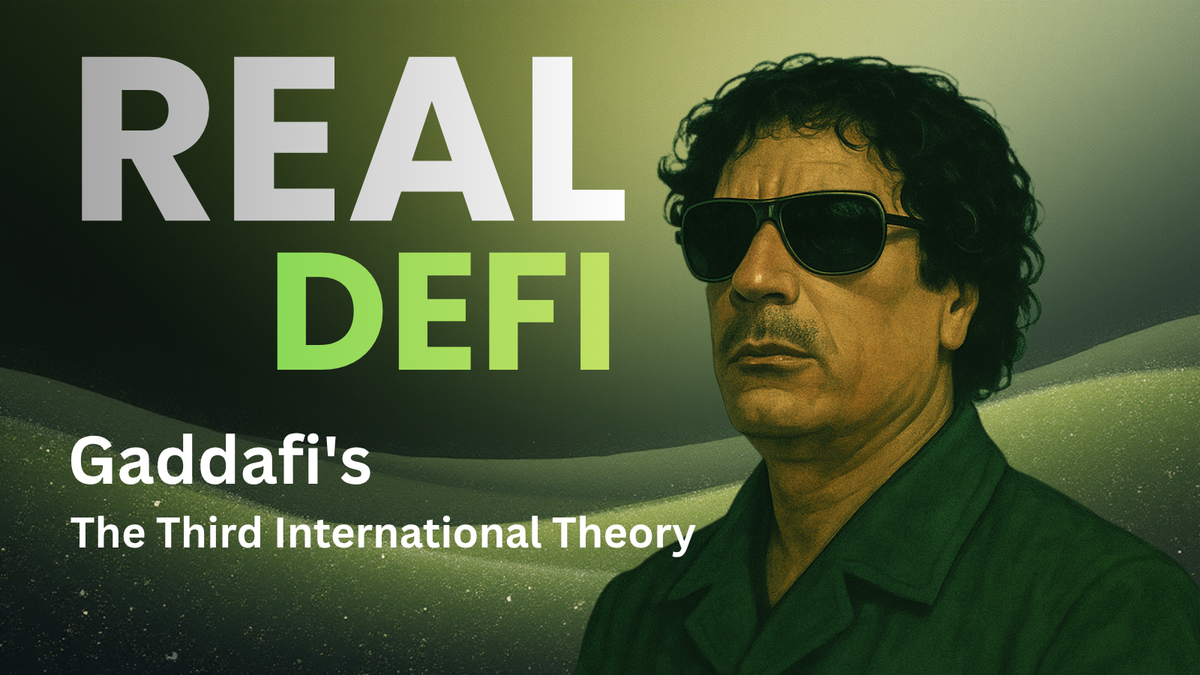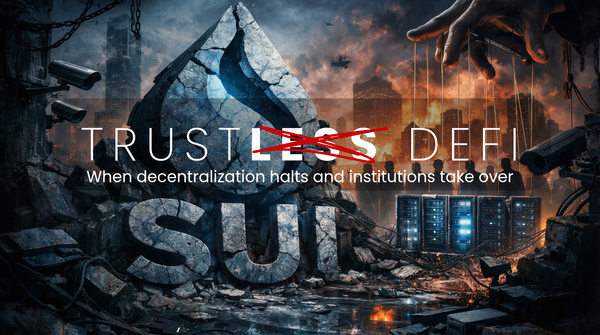Third International Theory
They buried Gaddafi to silence an idea. Instead, his vision of self-governance has been reborn inside the very code that now threatens every empire.

We talk about decentralisation as if it is new, as if it was born with Bitcoin, as if code itself invented sovereignty. But the idea is far older than the blockchain. Long before digital consensus or DAOs or trustless systems, there were minds that tried to build decentralisation by hand, using nothing but vision and will. They saw what centralisation does to a people, how it rots their autonomy and makes their freedom conditional. They saw that when power concentrates, corruption follows, whether it wears a crown, a suit, or a party badge. And some of them dared to imagine a world without that architecture. One of them was a man they told you was mad.
They have been rewriting the same story for decades. Every eastern leader who tried to build outside the Western banking order was branded a dictator. The pattern became so familiar that most people stopped seeing it. They told us Saddam was a monster, Assad a butcher, Gaddafi a lunatic in sunglasses who had lost his mind. Each time the same formula, demonise, destabilise, destroy, and then install democracy that looked suspiciously like dependency. But beneath that pattern was a deeper threat. It was not about oil, not really. It was about ideas.
In the 1970s, while the Cold War divided the planet between two illusions, capitalism and communism, Gaddafi wrote a small green book that quietly proposed the unthinkable, a world that needed neither. He called it the Third International Theory, and it was not another version of socialism or a desert born copy of Marx. It was something far more subversive, a philosophy that dismantled the very need for rulers, bankers, or bureaucrats. It declared that people could govern themselves directly, that parliaments and parties were systems of deceit, that wage labour was just a polite form of slavery, and that wealth belonged to those who created it, not to those who managed it. In his vision every worker became a partner, every community a small government of its own, and the state, that bloated idol of modern politics, would simply dissolve.
For a time Libya became a living experiment in that vision. Oil wealth funded free housing, education, and healthcare. Local councils began shaping their own regions. It was far from perfect, no human system ever is, but it was sovereign, self contained, and it worked. Most dangerously of all, Gaddafi started talking about a single African currency backed by gold. Imagine it, a continent freed from the IMF’s leash, trading oil in real money instead of paper debt. The idea alone could collapse the dollar’s empire. And that was when his countdown began.
When NATO came, they did not bomb a regime. They bombed an alternative. They bombed a model of independence that did not rely on Western banks, Western media, or Western permission. They bombed a man who had written down the blueprint for decentralised power decades before anyone spoke the word blockchain. Because at its heart, the Third International Theory was exactly that, an early manual for decentralisation. It proposed direct ownership instead of representation, collective consensus instead of elite control, local governance instead of global oversight. The only difference is that Gaddafi trusted people to honour it through moral unity, whereas our age builds it through mathematical trust.
He did not die for tyranny. He died because he broke the script. He dared to suggest that humanity did not need masters. And in a world run by a few who live off the many, that is the one sin that never gets forgiven. His end was meant to humiliate not just him but the very idea that power could belong to everyone.
But ideas do not die the way men do. The Third International Theory has mutated into code. It now lives inside blockchains, autonomous networks, and the quiet determination of individuals who refuse to be owned. Every wallet is a small republic. Every verified block is a vote. Every act of self custody is a page from that forbidden book rewritten in a new language. They buried Gaddafi in the desert, but the decentralised world he imagined has already begun to bloom above him.
And so when you hear the same old script, another Eastern villain, another campaign of chaos sold as salvation, remember what they really fear. Not the tyrant. Not the nation. But the moment the people remember they were never supposed to need permission in the first place.
There is one last thing worth saying. Many still call the Third International Theory a form of socialism, but that misses the point entirely. Socialism still depends on the state to enforce equality. Gaddafi’s theory sought to remove the state altogether. Socialism redistributes wealth. The Third Theory prevents its theft. In socialism, ownership sits with the collective through bureaucracy. In the Third Theory, ownership returns to the individual through participation. One builds power around a centre. The other dissolves the centre completely.
That is the distinction they could never allow the world to understand. Because once people see it clearly, they no longer argue about systems. They simply walk away from them.
Veritya Thalassa





